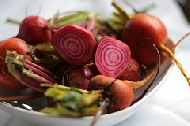Dietary Nitrates and Cardiorespiratory Function
Posted by Andrea Hacker MS, RD on October 22, 2012

The Starting Line:
Can adding beets to your diet improve performance?
Proper cardiovascular functioning requires nitrite and nitric oxide, byproducts of the nitrates in our diet. Nitric oxide has long been recognized as a potent vasodilator, and recent studies have confirmed that this effect can lower blood pressure in individuals without hypertension.
Two research groups have looked deeper into the effect of nitrates on blood pressure by studying how dietary nitrates affect exercise performance. Nitrate ingestion may lower the oxygen cost of physical activity by increasing metabolic efficiency of the cell, thus reducing energy waste and demand on the cardiorespiratory system.
In a recent study, Larsen, Weitzberg, Lundberg and colleagues, provided well-trained young men with either beet juice or a placebo beverage for three days before an exercise test. The experimental group receiving the beet juice had decreased oxygen consumption, higher efficiency, and lower blood pressure during the exercise test. A 2012 study by Cermak, Gibala, and van Loon reported that a single dose of nitrate given as beet root juice three hours before a cycling time trial improved times by 2.8%.
Nitrates were previously thought to be detrimental to health, due to factors such as the relationship between nitrates in processed meats and possible increased risk of gastrointestinal cancers. However, a recent review of the research by Ward, Heineman, Markin, and Weisenburger reported that there is no convincing evidence for the link between dietary nitrates and GI cancer risk .
Research studies demonstrated that 300-500 mg of dietary nitrates per day may reduce the metabolic cost of physical activity and enhance endurance performance. Use any supplement for three to fifteen days before an event. The best way to get these nitrates is not in a pill, but by eating green leafy vegetables and drinking beetroot juice. Vegetables provide about 80% of the nitrates in the American diet.
Rich sources of dietary nitrate:
Arugula - 4677 mg/kg
Beetroots - 1379 mg/kg
Butterleaf lettuce - 2026mg/kg
Celery - 1103 mg/kg
Spinach - 1066mg/kg
Iceberg lettuce - 875mg/kg
Carrots - 296 mg/kg
Broccoli - 279 mg/kg
Potatoes - 168 mg/kg
The Finish Line:
Eating a diet rich in green leafy vegetables will increase your dietary nitrates, which may enhance performance in endurance activities.
References:
1. Bescos R, Sureda A, Tur JA et al. The effect of nitric-oxide related supplements on human performance. Sports Med. 2012 ; 42:99-117 http://www.ncbi.nlm.nih.gov/pubmed/22260513
2. Cermak NM, Gibala MJ, van Loon LJC,. Nitrate supplementations improvement of 10KM time trial performance in trained cyclist. Int J Sport Nutr Exerc Metab. 2012; 22:64-71 http://www.ncbi.nlm.nih.gov/pubmed/22248502
3. Joint FAO/WHO Expert Committee on Food Additives Series 50: Nitrate and Potential endogenous formation of N-nitroso compounds.
4. Larsen FJ, Weitzberg E, Lundberg JO et al. Effects of dietary nitrate on oxygen cost during exercise. Acta Physio. 2007; 191:59-66 http://www.ncbi.nlm.nih.gov/pubmed/17635415
5. Ward MH, Heineman EF, Markin RS, Weisenburger DD. Adenocarcinoma of the stomach and esophagus and drinking water and dietary sources of nitrate and nitrite. Int J Occup Environ Health. 2008 Jul-Sep;14(3):193-7. http://www.ncbi.nlm.nih.gov/pubmed/18686719
Photo Credit: Crystl via photopin cc
*Note: This general information is not intended to be a substitute for medical treatment or advice. Always consult a professional before making changes to your health and wellness practices.
Feedback or suggestions for future topics? Let us know!

